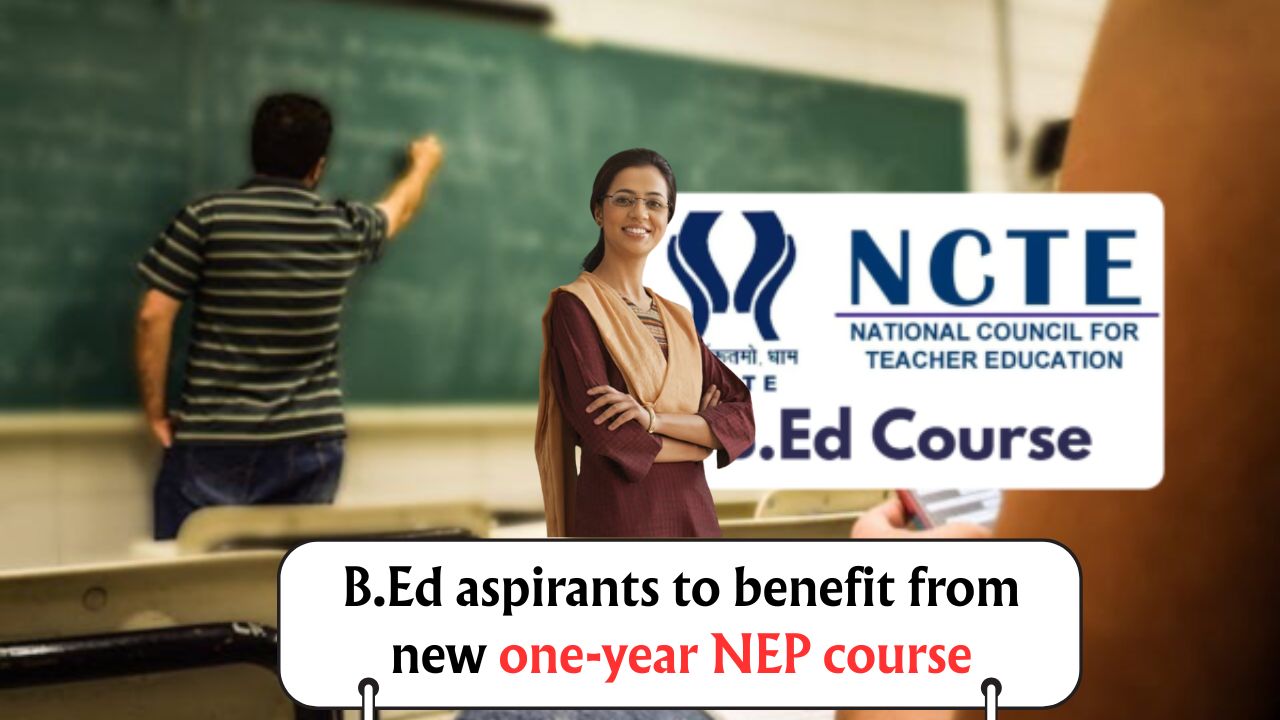NEP Fast-Track B.Ed – In a massive shift under the National Education Policy (NEP) 2020, the National Council for Teacher Education (NCTE) has introduced a groundbreaking 1-year B.Ed program for aspiring educators. Promising 100% placement assurance and streamlined eligibility, this course is set to transform teacher training in India. With official guidelines now published, aspirants finally have a clear, accelerated pathway into the education sector.
What is the New 1-Year B.Ed Program?
The new 1-year B.Ed program is a fast-track teacher training course designed for candidates who have already completed a postgraduate degree. Unlike the traditional 2-year or integrated 4-year B.Ed programs, this course enables quick certification with full placement support, helping India meet the rising demand for quality teachers in both public and private schools.
Key Highlights:
- Duration: Only 1 year
- Eligibility: Must have a PG degree with at least 55% marks
- Placement: 100% guaranteed (as per NCTE claims)
- Regulatory Body: NCTE (National Council for Teacher Education)
- Implementation: From academic year 2025 onwards
- Institutions: Over 300 universities expected to roll out the program
Who is Eligible for the 1-Year B.Ed Course?
The NCTE has set strict yet inclusive eligibility standards for the new B.Ed course. It targets postgraduate candidates aiming to enter the teaching profession swiftly.
Eligibility Criteria Table:
| Criteria | Details |
|---|---|
| Minimum Qualification | Postgraduate (Master’s Degree) in any discipline |
| Minimum Marks | 55% (Relaxation for reserved categories as per policy) |
| Age Limit | No upper age limit specified |
| Teaching Aptitude Test | May be conducted by institutions or NCTE guidelines |
| Course Duration | 1 Academic Year |
| Intake Capacity per Institution | Maximum of 50 students per batch |
| Reservation Policy | As per UGC/State Government norms |
| Course Fee | To be decided by individual institutions (Est. ₹45K–₹80K) |
What Makes This B.Ed Program Unique?
The NEP’s 1-year B.Ed program is a direct answer to India’s need for qualified teachers without compromising on quality.
Unique Features:
- NEP-Driven: Aligns with India’s 21st-century education reforms
- Accelerated Learning: Quick turnaround for certified employment
- Field-Based Training: Real school immersion, not just theory
- Tech-Integrated Curriculum: Includes digital teaching tools and EdTech exposure
- State & Central Placement Support: Tie-ups with schools, NGOs, and EdTech companies
- Merit-Based Selection: Transparent admission through PG merit or entrance exam
Full Roadmap Released by NCTE
The NCTE has dropped a detailed roadmap covering every phase from application to employment. Here’s what you can expect:
NCTE Roadmap Overview Table:
| Phase | Timeline | Description |
|---|---|---|
| Official Notification | May 2025 | Detailed guidelines published by NCTE |
| University Approvals | June–August 2025 | Institutions receive permission to start the course |
| Admission Process | August–September 2025 | Centralized or direct admissions based on PG merit |
| Course Start Date | October 2025 | Academic session begins across approved universities |
| Mid-Term Practicum | Jan–Feb 2026 | In-school training and project submission |
| Final Assessment | June 2026 | Theory + Practical Evaluation |
| Placement Drives | July–August 2026 | On-campus recruitment by govt/private schools |
| Certificate Issuance | August 2026 | NCTE-recognized B.Ed certificate provided |
Placement Guarantee: Real or Hype?
According to NCTE, this course comes with a 100% placement guarantee, especially due to teacher shortages in rural and government schools. Here’s how the placement process works:
- Placement Tie-Ups: NCTE has coordinated with multiple school boards and education departments
- Campus Drives: Organized towards the end of the academic session
- Govt. School Demand: Vacancies in primary & upper primary levels ensure availability
- EdTech Opportunities: Startups and e-learning companies will also recruit graduates
How to Apply for the Fast-Track B.Ed Course?
Applying is expected to be a simplified, online process. Some universities may use PG merit lists, while others could conduct entrance tests.
Application Process:
- Visit official university or NCTE website
- Check eligibility and course availability
- Fill online application form
- Upload PG mark sheets and personal documents
- Wait for merit list or entrance test call
- Attend counseling (if required)
- Confirm admission and pay course fee
Course Curriculum: What Will You Learn?
The curriculum is designed to ensure classroom readiness and 21st-century teaching skills.
Key Subjects Covered:
- Teaching Methodologies (Subject-Specific)
- Educational Psychology
- Curriculum & Assessment Planning
- Inclusive Education
- Digital Tools in Teaching (EdTech Training)
- Classroom Management
- Pedagogical Theories & Practice
- Practical Internship in Schools
The new 1-year B.Ed program is a golden opportunity for postgraduates who want to quickly enter the teaching profession with a credible certificate. With NCTE backing, clear eligibility, structured roadmap, and placement assurance, it offers both flexibility and security. For candidates who missed out on B.Ed earlier or are mid-career switchers, this might be the best route forward.
However, aspirants must stay cautious about:
- Fake colleges without NCTE recognition
- States that may delay adoption of the new model
- Overcrowded application numbers in popular cities
Always verify the institute’s recognition status and check for placement assistance before applying.
FAQs
1. Can final-year PG students apply for the 1-year B.Ed course?
Yes, some institutions may allow provisional admission with conditions.
2. Is this course valid for teaching in government schools?
Yes, if the course is completed from an NCTE-recognized institute.
3. Will all states implement the 1-year B.Ed from 2025?
Implementation may vary by state, but central guidelines will push uniformity.
4. Is there a national-level entrance test for this program?
As of now, there is no central test. Institutes may conduct their own entrance or rely on PG merit.
5. Can I pursue this course through distance education or online mode?
Currently, the course is designed for full-time, offline classroom and practicum engagement as per NCTE norms.
